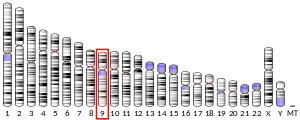SH2D3C
SH2 domain containing 3C, also known as SH2D3C, is a protein that in humans is encoded by the SH2D3C gene.[5]
Function
Sh2d3c is a gene on human chromosome 9 that encodes an SH2 domain containing protein known as NSP3. The mouse homologue is found on chromosome 2. The NSP (Novel SH2-containing Protein) family of proteins contains three members, NSP1, NSP2, and NSP3 (this protein), all of which have a similar architecture, with an N-terminal SH2 domain, a proline serine rich region, which contains consensus sequences for MAP kinase substrates, and a conserved C-terminus, which binds to the Cas family of adapter proteins, and also shows homology to GEF domains.
NSP3 was originally identified by three independent groups of researchers.[6][7][8] The mouse homologue of NSP3 has been shown to have two distinct isoforms, generated by alternative splicing, that are expressed in different tissues. The shorter isoform, known as Chat (Cas/Hef1 associated signal transducer) is expressed in brain, lung, heart, kidney, muscle, liver, and intestine, while the larger isoform, known as Chat-H (the "H" is for Hematopoietic), is expressed in spleen, thymus, and lymph nodes.[8] The two isoforms differ only in their N-terminus, which has been shown by one group to be important for membrane localization.[9]
Through its interaction with Hef1, Chat-H, has been shown to be an important regulator of lymphocyte adhesion, acting upstream of Rap1 in the integrin activation pathway.[9]
References
- GRCh38: Ensembl release 89: ENSG00000095370 - Ensembl, May 2017
- GRCm38: Ensembl release 89: ENSMUSG00000059013 - Ensembl, May 2017
- "Human PubMed Reference:". National Center for Biotechnology Information, U.S. National Library of Medicine.
- "Mouse PubMed Reference:". National Center for Biotechnology Information, U.S. National Library of Medicine.
- "Entrez Gene: SH2D3C SH2 domain containing 3C".
- Lu Y, Brush J, Stewart TA (April 1999). "NSP1 defines a novel family of adaptor proteins linking integrin and tyrosine kinase receptors to the c-Jun N-terminal kinase/stress-activated protein kinase signaling pathway". The Journal of Biological Chemistry. 274 (15): 10047–52. doi:10.1074/jbc.274.15.10047. PMID 10187783.
- Dodelet VC, Pazzagli C, Zisch AH, Hauser CA, Pasquale EB (November 1999). "A novel signaling intermediate, SHEP1, directly couples Eph receptors to R-Ras and Rap1A". The Journal of Biological Chemistry. 274 (45): 31941–6. doi:10.1074/jbc.274.45.31941. PMID 10542222.
- Sakakibara A, Hattori S (March 2000). "Chat, a Cas/HEF1-associated adaptor protein that integrates multiple signaling pathways". The Journal of Biological Chemistry. 275 (9): 6404–10. doi:10.1074/jbc.275.9.6404. PMID 10692442.
- Regelmann AG, Danzl NM, Wanjalla C, Alexandropoulos K (December 2006). "The hematopoietic isoform of Cas-Hef1-associated signal transducer regulates chemokine-induced inside-out signaling and T cell trafficking". Immunity. 25 (6): 907–18. doi:10.1016/j.immuni.2006.09.014. PMID 17174122.
Further reading
- Near RI, Zhang Y, Makkinje A, Vanden Borre P, Lerner A (September 2007). "AND-34/BCAR3 differs from other NSP homologs in induction of anti-estrogen resistance, cyclin D1 promoter activation and altered breast cancer cell morphology". Journal of Cellular Physiology. 212 (3): 655–65. doi:10.1002/jcp.21059. PMC 2640322. PMID 17427198.
- Vervoort VS, Roselli S, Oshima RG, Pasquale EB (April 2007). "Splice variants and expression patterns of SHEP1, BCAR3 and NSP1, a gene family involved in integrin and receptor tyrosine kinase signaling". Gene. 391 (1–2): 161–70. doi:10.1016/j.gene.2006.12.016. PMC 1876674. PMID 17270363.
- Rual JF, Venkatesan K, Hao T, Hirozane-Kishikawa T, Dricot A, Li N, Berriz GF, Gibbons FD, Dreze M, Ayivi-Guedehoussou N, Klitgord N, Simon C, Boxem M, Milstein S, Rosenberg J, Goldberg DS, Zhang LV, Wong SL, Franklin G, Li S, Albala JS, Lim J, Fraughton C, Llamosas E, Cevik S, Bex C, Lamesch P, Sikorski RS, Vandenhaute J, Zoghbi HY, Smolyar A, Bosak S, Sequerra R, Doucette-Stamm L, Cusick ME, Hill DE, Roth FP, Vidal M (October 2005). "Towards a proteome-scale map of the human protein-protein interaction network". Nature. 437 (7062): 1173–8. doi:10.1038/nature04209. PMID 16189514. S2CID 4427026.
- Dail M, Kalo MS, Seddon JA, Côté JF, Vuori K, Pasquale EB (October 2004). "SHEP1 function in cell migration is impaired by a single amino acid mutation that disrupts association with the scaffolding protein cas but not with Ras GTPases". The Journal of Biological Chemistry. 279 (40): 41892–902. doi:10.1074/jbc.M402929200. PMID 15272013.
- Sakakibara A, Hattori S, Nakamura S, Katagiri T (February 2003). "A novel hematopoietic adaptor protein, Chat-H, positively regulates T cell receptor-mediated interleukin-2 production by Jurkat cells". The Journal of Biological Chemistry. 278 (8): 6012–7. doi:10.1074/jbc.M207942200. PMID 12486027.
- Sakakibara A, Hattori S (March 2000). "Chat, a Cas/HEF1-associated adaptor protein that integrates multiple signaling pathways". The Journal of Biological Chemistry. 275 (9): 6404–10. doi:10.1074/jbc.275.9.6404. PMID 10692442.
- Dodelet VC, Pazzagli C, Zisch AH, Hauser CA, Pasquale EB (November 1999). "A novel signaling intermediate, SHEP1, directly couples Eph receptors to R-Ras and Rap1A". The Journal of Biological Chemistry. 274 (45): 31941–6. doi:10.1074/jbc.274.45.31941. PMID 10542222.
- Lu Y, Brush J, Stewart TA (April 1999). "NSP1 defines a novel family of adaptor proteins linking integrin and tyrosine kinase receptors to the c-Jun N-terminal kinase/stress-activated protein kinase signaling pathway". The Journal of Biological Chemistry. 274 (15): 10047–52. doi:10.1074/jbc.274.15.10047. PMID 10187783.
- Regelmann AG, Danzl NM, Wanjalla C, Alexandropoulos K (December 2006). "The hematopoietic isoform of Cas-Hef1-associated signal transducer regulates chemokine-induced inside-out signaling and T cell trafficking". Immunity. 25 (6): 907–18. doi:10.1016/j.immuni.2006.09.014. PMID 17174122.
External links
- SH2D3C human gene location in the UCSC Genome Browser.
- SH2D3C human gene details in the UCSC Genome Browser.



